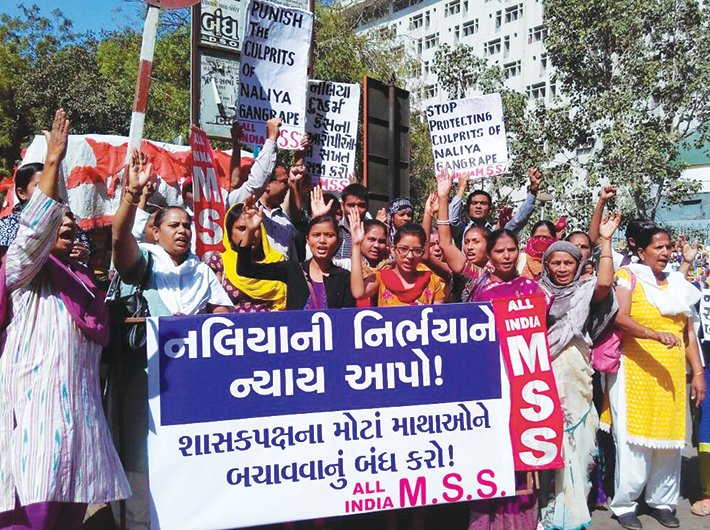A sexual-exploitation racket involving BJP politicians puts the ruling party on the mat
The gang-rape and forcing into prostitution of a 19-year-old woman from Naliya, in western Kutch, by people with links to the ruling BJP (in the state as well as the centre) has once again brought the spotlight on gender violence across the country. The case has started a political storm in Gujarat, and the victim is being called “the Nirbhaya of Naliya”.
According to Meenakshi Joshi, Gujarat convener of the All India Mahila Sanskritik Sangathan, the victim’s parents, who she met in Kothara, in Abdasa taluka of the district, told her: “Every day, our daughter would return home tired. She would straightaway go to her room and sleep for hours without even speaking to us. She was depressed and unhappy all the time, which we assumed was because of her recent separation from her husband. Little did we know she was being tortured like this.”
The story of the girl’s travails was unfolded to Joshi, who was part of a fact-finding team of the Forum of Concerned Citizens for the Naliya Incident. The team, which includes members of women’s organisations, advocates and trade union activists, has prepared a report based on its findings.
According to the findings of the committee, the victim was married at the age of 16 to a man she was in love with and settled with him in Mumbai. But within a few months, she faced marital problems and eventually decided to separate from her husband. In August 2015, at 19, she came to live with her parents in Kothara village near Naliya. Since her parents were of limited means, she decided to look for a job and approached Baba Sheth, a local mobile shop owner, who took her to Shantilal Solanki, an employee of an LPG distribution agency. He promised her a job on a salary of Rs 5,500 every month.
Ahead of Diwali, the woman asked Solanki to pay her half the salary in advance, to which he said she could come to his house and collect it. When she visited him, Solanki allegedly gave her a spiked drink and, with his friends Bharat Darji and Vipul Thakkar, raped her and shot video clips of the assault. For more than a year, the woman was allegedly blackmailed into sex slavery, and forced to serve people at hotels, farmhouses and parties.
When she could take it no more, the woman apparently reconciled with her first husband (she’d had a brief second marriage too), who encouraged her to file a complaint. In October last year, she approached Kutch MP Vinod Chavda and told him of what she had been put through. “He assured her he’d take up the case and explain the procedure for filing a complaint. However, he did not take any action. For the next few months, the woman got no response from the police or the MP. He must have tipped the culprits and informed the people protecting the main accused,” says Joshi. “The MP should be punished first, as a public servant, it is his responsibility to protect the citizens. Even after the arrest, all accused have Bhuj’s best advocates fighting their case.”
The woman then decided to file an FIR at the Naliya police station on January 12. But the application was delayed and marked as received on January 18 and was registered as an FIR on January 25. “This gave the accused 13 days to figure a way out of the situation and plan their next step,” says Joshi.
According to the forum’s report, the FIR details a sex scandal in which some 65 persons trapped at least 35 women. The woman from Kothara has named nine persons: Shantilal Solanki, Bharat Darji, Baba Sheth, Chetan Thakkar, Ashwin Thakkar, Ajit Parumal, Vasant Bhanushali, Govind Parumalani and Vipul Thakkar. The first eight have been arrested. She had also mentioned a physically challenged man, later identified by police as Ajit Ramwani.
Solanki was the convener of the BJP’s Baxi Panch (or OBC) cell for Abdasa taluka. Govind Parumalani and Ajit Ramwani were BJP councillors in the Gandhidham municipality, and Vasant Bhanushali was a party worker. She also said that the women were given “Deen Dayal Education workshop BJP identity cards”, which allowed them admission to the party’s functions.
In her complaint, the victim alleged that she was a victim of multiple gang-rapes by ten males for more than one year. She also alleged that Solanki offered her Rs 1 crore to remain silent and also tried to menace her into withdrawing the FIR. “Due to the threats and intimidation, that continue after the arrests, the father of the girl feels unsafe and fears attacks. Other girls who were forced into the sex racket are not willing to come forward and speak up. The accused are offering them money and may have threatened them,” says Joshi.
Protests began across the state as the All India Mahila Sanskritik Sangathan, the All India Democratic Students Organisation, the Ahmedabad Women’s Action Group and Majoor Mahajan Sangh took up the cause of the victims. The Aam Aadmi Party (AAP) and Congress also condemned the incident and joined the protests. Forced to take action, the BJP suspended four members involved in the case. The party says its official ID cards of women do not bear their photographs; besides, the so-called ID cards describe the women as “social lady”, a non-existent position.
“I believe this is the first time that in an incident of rape, the ruling BJP has held several press conferences to claim it has nothing to do with the case,” says Joshi. She alleges that the Kutch district BJP president, KC Patel, showed reporters a photo of the victim, which is both insensitive and illegal.
Meanwhile, the Congress took out a ‘Beti Bachao’ rally that started in Naliya on February 18 and reached Gandhinagar two days later. Congress MLAs disrupted the budget session of the assembly during the governor’s speech, raising the slogan, “Beti bachao, balatkariyo se beti bachao (Save daughters from rapists).”
Dressed in black, Congress members demanded an inquiry by a sitting judge of the Gujarat high court. Later, a few Congress MLAs, led by the leader of the opposition in the assembly, Shankersinh Vaghela, walked out.
“Shankersinh Vaghela publicly announced he had a CD with the video clip of the assault and if the home minister wants, he will send it to him. We demanded that it should be submitted to the chief justice of the Gujarat high court and inquiry be conducted. But instead of giving the CD, he has made some sort of a compromise. We don’t know what kind of bargain he has made,” says Joshi.
On February 22, chief minister Vijay Rupani assured the opposition and the Congress that none of the guilty would go unpunished. He announced a judicial probe in the incident.
The state women’s commission has sought a report from the police, but hasn’t received any response, says Joshi, who has also met members of the Kutch Mahila Vikas Sangathan, which is trying to encourage other victims to come forward. She says that the national commission for women (NCW) did visit Gandhinagar recently, but it was to inquire about the status of acid attack cases and the like. “The most shocking thing was that NCW was not coming for the Naliya incident, but for an inquiry into acid attacks. If they had come, it was their obligation to at least look into this case. The members met the DSP and IG. They didn’t even care to make a statement on the Naliya incident,” says Joshi.
Meanwhile, complications have arisen over the victim’s second marriage, which has recently come to light. Last year, the victim’s parents had married her to one Kalpesh Momaya of a neighbouring village, hoping it might ease her depression over the failed first marriage. But this too ended in eight days. Joshi says, “Maybe this was because the husband suspected she was being exploited.” Momaya is learnt to have moved a Bhuj court, alleging that she had married him for his money and was blackmailing him.
The Naliya case is reminiscent of the infamous ‘ice-cream parlour case’ of Kerala. In the 1990s, it had come to light that a number of young women were offered jobs in an ice-cream parlour and pushed into prostitution. Investigations revealed the involvement of many political figures.
yoshika@governancenow.com
(The report appears in the March 1-15, 2017 issue of Governance Now)

